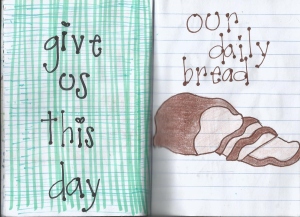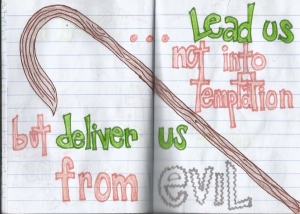The last part of the model prayer for the disciples consists of petition for three things. Because I have a certain penchant for alliteration, I’ll call these petitions:
- provision
- pardon, and
- protection
 One of the names of God that stood out to me was Jehovah Jireh, which means “The Lord shall provide”. It was used in the OT when Abraham’s faith was put to the test and a ram in the thicket was provided, sparing Isaac’s life. Through the Old Testament, there are pictures of this provision. One of the most vivid examples is the provision of manna to the children of Israel as they wandered in the desert.
One of the names of God that stood out to me was Jehovah Jireh, which means “The Lord shall provide”. It was used in the OT when Abraham’s faith was put to the test and a ram in the thicket was provided, sparing Isaac’s life. Through the Old Testament, there are pictures of this provision. One of the most vivid examples is the provision of manna to the children of Israel as they wandered in the desert.
Manna was gathered daily when God provided for His people wandering in the desert. Since we are told that man does not live by bread alone, but by every word that comes from the mouth of God, (Matthew 4:4) it’s fairly clear that collecting His words and applying them to our lives on a daily basis is as nourishing and beneficial to our spiritual health as food is to our body. Remember, manna didn’t keep to the next day…the children of Israel had to go out every day and collect it for use that day…same with God’s word. What we ate last week just doesn’t taste the same after being reheated and served night after night. In the same way, what we learned yesterday on our journey was used to nourish us and build us up, doesn’t taste as fresh the next day. No wonder we find God’s word “stale” and “dry”. If we haven’t gathered our bread for today, we are resorting to munching on stale dry leftover manna from yesterday’s feast.
Now, we know from Scripture that Jesus is the Word of God (John 1:1) who came from heaven (John 17), and He boldly refers to Himself in John 6 as the “Living Bread that came down from heaven…that gives life to the world” (John 6:32, 51). In doing so, Jesus is not merely comparing Himself to this manna, but actually earnestly laying claim to actually being that same manna that was provided for the wandering Israelites in the desert. He goes on in this chapter to further baffle, confront, and completely gross out many of his followers. These same people who had followed him, listened to Him teach, watched Him perform miraculous deeds, tasted of His provision, and hailed him as a prophet after seeing the miracle of the fish and loaves just yesterday, are now confused, irritated, and disgusted at the mental picture of His words today.
When His former fans turned to leave Him, Jesus did not recant His words. He didn’t correct them for misunderstanding his intention, or sugar-coat His message to make it palatable. He could have kept His numbers up here; all He had to do was make His flesh and blood regular bread and grape juice…or a symbol of a deeper spiritual truth. But He didn’t. In fact, each time He reiterated his clarification, His terminology got more specific and graphic. He went from talking about being bread sent from heaven, to the importance of eating, consuming, or devouring His body as a meal (Strong’s 5315), and finally to gnawing, crunching or chewing his flesh (Strong’s 5176). So greatly repulsed were they, that the Bible says that many of them turned back and no longer followed Him.
Jesus is still the answer to our petition for provision, and continues to offer Himself as our daily bread. Today, His followers are posed the same question Jesus asked His disciples then. “Will you leave also?” Those disciples who continued to follow did so for the sake of eternal life. And they did so with the understanding that partaking of His body was essential to eternal life. So it is with His followers today. Where else would we go? He alone has the words of eternal life.
Jehovah Jireh showed Himself as “Provider” again years later on Mount Calvary, when He provided the ultimate sacrifice for our sins.
Romans 3:23 tells us that “all have sinned and fall short of the glory of God” It’s true, when we sin, we fall short of God’s glory, we offend His nature, and hurt His heart. We are in need of His mercy and pardon for our sin, and it comes natural for us to ask, knowing that He is all-forgiving, and all-loving, and desires our fellowship.
When we sin, that sin doesn’t only offend the heart and the nature of God, and affect our relationship/fellowship with Him, but we also hurt the community of fellowship that He has established, in His body, the Church. In other words, when we make a mess of things, often it gets on others as well as ourselves and God. If, as John 17 states, the world sees Jesus and knows that He has been sent by God by the way His followers function and relate to others, then sin against the body of Christ also affects my witness to the world that Jesus is Lord. My mess affects my message.
I have such a hard time with this part of the Lord’s prayer. My nature wants to hold onto hurt, rehearse it, coddle it…pick at the scab, and blame someone else for the wound in me that will not heal. But according to this verse, I have to extend to others who have offended and wounded me, that same mercy and pardon that I ask from the Lord for myself. And just in case I thought I could weasel out of it, He gets super specific and doesn’t pull any punches when He spells it our clearly for us. It’s almost like He knew we would need further clarification, so he draws us an “if/then” picture:
I illustrated this in my prayer journal by turning all the T’s into crosses. It helps me to remember the price of my own forgiveness was the laying down of His life when Jesus died on the cross. In the same way, I am called to take up my cross and follow Him. And that cross is heavy to carry, but it’s even heavier when I realize the destination of that cross…death.
For me, this is another bag of M&Ms. I find myself hurt all over again by a past offense against me, and I have to hoist up that cross again, and carry it to Calvary, I truly believe actively pursuing this thought is a key to our process of sanctification, becoming holy, here in this sin-stained world. Only when I die to myself, can I extend forgiveness to others and receive pardon for myself.
“I am the good Shepherd…”
Because this final petition for protection brings to my mind a picture of our Good Shepherd, I chose to illustrate this page with a staff. A staff is a multi-purpose walking stick that provides balance for the shepherd and protection for the sheep, as it can be used along the hike to check for dangerous undergrowth, prod a wandering sheep back into the fold, or rescue a wayward or fallen one.



